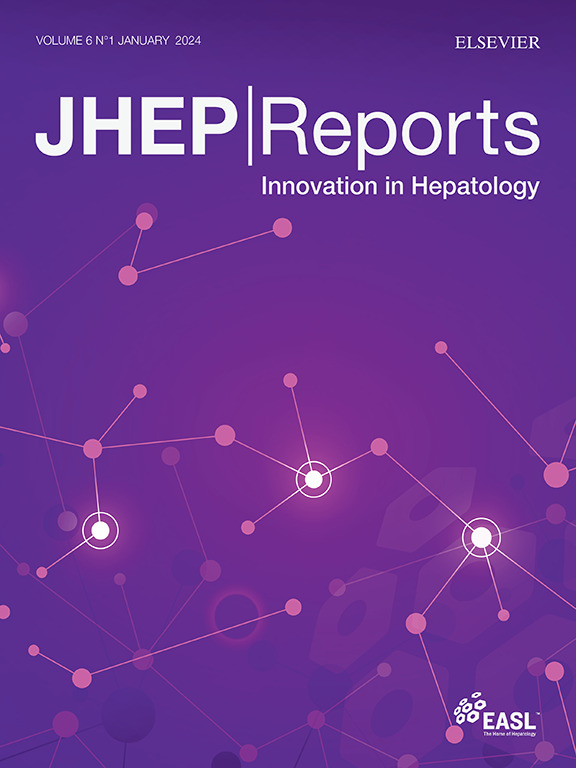PLOD1通过促进NF-κB/IL-6/ stat3依赖的TCA循环促进肝细胞癌的恶性化
IF 9.5
1区 医学
Q1 GASTROENTEROLOGY & HEPATOLOGY
引用次数: 0
摘要
背景,目的:前胶原lysyl羟化酶1 (PLOD1)在调节胶原合成和交联中起重要作用。然而,其在肝细胞癌(HCC)进展中的作用和潜在机制尚不清楚。在此,我们旨在研究PLOD1在HCC中的潜在生物学功能和机制。方法采用qPCR、Western blot和免疫组化检测肝癌组织中PLOD1的表达水平。通过CCK8、流式细胞术、球形成和醛脱氢酶活性检测检测细胞增殖、凋亡和干性。体内实验采用皮下致瘤性模型、原位致瘤性模型和肝毒素诱导的肝癌模型。进行rna序列和非靶向代谢组学分析以确定潜在机制。结果plod1在人(p <0.0001)和小鼠HCC中均高表达(p <0.01),并与预后不良相关(p = 0.047)。体外和体内实验表明,PLOD1过表达可促进HCC细胞的增殖和干细胞化。同时,PLOD1的缺失会减弱HCC的发生和生长,导致HCC细胞周期阻滞(p <0.01)和细胞凋亡(p <0.001)。在机制上,PLOD1正调控NF-κB/IL-6/STAT3信号通路,加速TCA循环代谢重编程。阻断NF-κB/IL-6/STAT3信号通路和TCA循环可有效减轻plod1诱导的HCC细胞增殖和干细胞性。结论我们的研究发现PLOD1/NF-κB/IL-6/STAT3轴可作为抑制HCC进展和发生的治疗靶点。影响和意义PLOD1在HCC进展中的作用和潜在机制尚不清楚。在本研究中,我们报道PLOD1在HCC患者中高表达,并通过激活NF-κB/IL-6/ stat3依赖的TCA循环来促进HCC细胞的增殖和干细胞性。使用腺相关病毒敲除肝脏PLOD1可减少小鼠HCC的进展,这表明PLOD1可能是HCC的潜在治疗靶点。本文章由计算机程序翻译,如有差异,请以英文原文为准。

PLOD1 promotes the malignancy of hepatocellular carcinoma by facilitating the NF-κB/IL-6/STAT3-dependent TCA cycle
Background & Aims
Procollagen lysyl hydroxylase 1 (PLOD1) is crucial in regulating collagen synthesis and cross-linking. However, its roles and underlying mechanisms in the progression of hepatocellular carcinoma (HCC) remain unclear. Herein, we aimed to investigate the underlying biological functions and mechanisms of PLOD1 in HCC.
Methods
The expression levels of PLOD1 in HCC were measured by qPCR, Western blot, and immunohistochemistry. Cell proliferation, apoptosis, and stemness were examined by CCK8, flow cytometry, sphere formation, and aldehyde dehydrogenase activity assays. The subcutaneous tumorigenicity model, orthotopic tumorigenicity model, and hepatotoxin-induced HCC model were used for in vivo experiments. RNA-sequence and untargeted metabolomics analysis were performed to identify underlying mechanisms.
Results
PLOD1 is found to be highly expressed in both human (p <0.0001) and mouse HCC (p <0.01) and is associated with a poor prognosis (p = 0.047). In vitro and in vivo experiments reveal that overexpression of PLOD1 promotes the proliferation and stemness of HCC cells. Meanwhile, the depletion of PLOD1 attenuates the occurrence and growth of HCC, leading to cell cycle arrest (p <0.01) and apoptosis (p <0.001) in HCC. Mechanistically, PLOD1 positively regulates the NF-κB/IL-6/STAT3 signaling pathway and accelerates TCA cycle metabolic reprogramming. Blocking the NF-κB/IL-6/STAT3 signaling pathway and TCA cycle can effectively mitigate PLOD1-induced proliferation and stemness of HCC cells.
Conclusions
Our study uncovers the PLOD1/NF-κB/IL-6/STAT3 axis as a therapeutic target for inhibiting the progression and stemness of HCC.
Impact and implications
The roles and underlying mechanisms of PLOD1 in the progression of HCC remain unclear. In this study, we report that PLOD1 is highly expressed in patients with HCC and promotes the proliferation and stemness of HCC cells by activating the NF-κB/IL-6/STAT3-dependent TCA cycle. Knocking down hepatic PLOD1 using adeno-associated virus results in reduced progression of HCC in mice, suggesting that PLOD1 may serve as a potential therapeutic target for HCC.
求助全文
通过发布文献求助,成功后即可免费获取论文全文。
去求助
来源期刊

JHEP Reports
GASTROENTEROLOGY & HEPATOLOGY-
CiteScore
12.40
自引率
2.40%
发文量
161
审稿时长
36 days
期刊介绍:
JHEP Reports is an open access journal that is affiliated with the European Association for the Study of the Liver (EASL). It serves as a companion journal to the highly respected Journal of Hepatology.
The primary objective of JHEP Reports is to publish original papers and reviews that contribute to the advancement of knowledge in the field of liver diseases. The journal covers a wide range of topics, including basic, translational, and clinical research. It also focuses on global issues in hepatology, with particular emphasis on areas such as clinical trials, novel diagnostics, precision medicine and therapeutics, cancer research, cellular and molecular studies, artificial intelligence, microbiome research, epidemiology, and cutting-edge technologies.
In summary, JHEP Reports is dedicated to promoting scientific discoveries and innovations in liver diseases through the publication of high-quality research papers and reviews covering various aspects of hepatology.
 求助内容:
求助内容: 应助结果提醒方式:
应助结果提醒方式:


